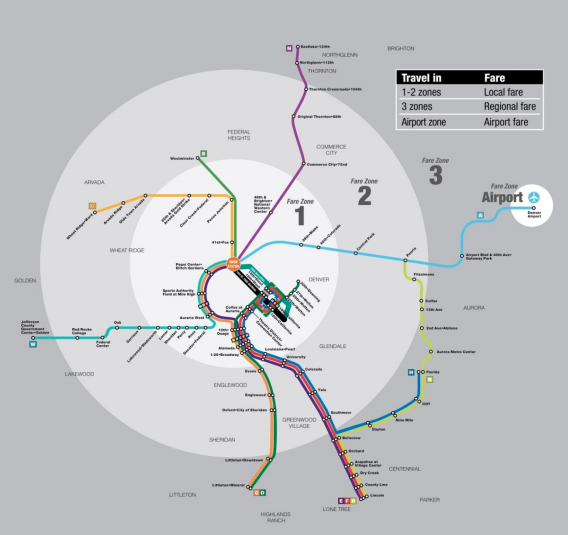RTD Votes on Fare Changes Tonight, But Not Discounts for Low-Income Riders

The Regional Transportation District’s fare structure has never been simple. With three tiers of prices that vary according to how far you travel, even locals have trouble figuring out what their trips cost. If a restaurant menu was as confusing as Denver’s transit pricing, it would lose out on a lot of customers.
In an attempt to simplify riding the bus and rail while balancing the agency’s budget, RTD staff will recommend a new price structure and fare hikes tonight. After a few months of public input, the Board of Directors will vote on changes to take effect on January 1, 2016. If you want to weigh in, tonight is your last chance.
The first fare increase since 2011 and the elimination of paper transfers have been the major topics of discussion at public meetings. Advocates led by Mile High Connects have also pushed a third item onto RTD’s agenda: fare discounts for low-income riders. While the discounts won’t be voted on tonight, RTD officials have agreed to take it into consideration going forward.
More on that pledge in a minute. First, here are the major proposed changes to the fare structure:
- The express and regional zones will be consolidated into one zone called “regional.” That leaves two types of fares — local and regional — plus the new airport zone.
- A trip to DIA on the new East Rail Line will cost $9 one-way.
- Paper transfers for one-way single rides will be eliminated. As a substitute, RTD will offer passes good for unlimited rides in a one-day period at the price of one round-trip fare.
Here is the new pricing for one-way trips:

Here are the new (lower!) prices for day passes with unlimited rides:

And finally, the new cost of monthly passes:

To make things a little more confusing (but cheaper) RTD will offer discounts and transfers to smart card users. However, smart cards — reusable electronic fare cards on which users can store and add money — aren’t available to the general public. Only college students, businesses, and organized neighborhood groups can buy them. Exactly when that will change remains up in the air, but January 1 is the goal.
More Affordable Fares for Low-Income Riders
Mile High Connects, an advocacy group that aims to make transit accessible for everyone, launched a campaign to halve fares for anyone making 150 percent of the federal poverty level or less. That’s about $35,000 a year or less for a family of four.
The discount fare program would cost RTD about $12 million per year, according to a March report from Mile High Connects. The recommendation calls for a non-profit coalition to cover some of the costs, and suggests among other things that RTD raise money by charging parking fees at park-and-ride lots.
RTD appears to be open to the idea but hasn’t made any commitments. Transit advocates pressed the board to postpone tonight’s vote until an arrangement could be hammered out, but only one board member, Paul Solano, was willing. The conversation will continue, but probably won’t conclude until after the other changes are adopted, according to RTD board members.
That’s not ideal, said Mile High Connects Director Dace West. Though RTD’s efforts are encouraging — she even called them “monumental” — she wants a firm commitment.
“I think what we’d love to see from the board is a strong statement that a robust affordability program would be in place at the point that the new fares go into effect,” West said. “That said, I think that the conversations are proceeding in a really productive way.”
Currently, anyone over 65, people with disabilities, Medicare recipients, and students age 6 to 19 receive half-price RTD fares, regardless of income level. Adopting the Mile High Connects proposal would put Denver in the same company as Seattle, which has a similar program with a higher threshold ($48,000 for a family of four) and a sliding fare scale based on income.
“I do still think it’s in the board’s authority and it’s their responsibility to have this affordable component,” West said.
To weigh in tonight, head down to RTD headquarters at 1600 Blake Street. The meeting starts at 5:30 p.m.


